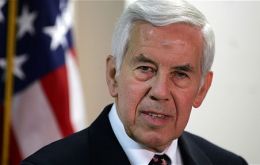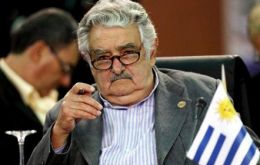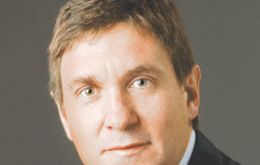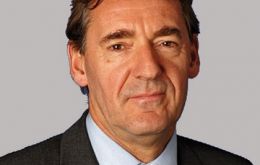MercoPress. South Atlantic News Agency
Economy
-
Monday, December 5th 2011 - 20:24 UTC
“Mercozy” Euro ‘fiscal control’ plan to be announced Wednesday

French President Nicolas Sarkozy and German Chancellor Angela Merkel met in Paris on Monday to align their positions on centralizing control of Euro zone budgets to stem a debt crisis that threatens Europe's currency union.
-
Monday, December 5th 2011 - 06:51 UTC
Top Republican claims Obama is losing the Brazil battle to China

The US top Republican on the Senate Foreign Relations Committee said President Barack Obama is missing opportunities to strike closer ties with Brazil, allowing China to steal market share from US companies in Latin America’s biggest economy.
-
Monday, December 5th 2011 - 06:48 UTC
Mujica calls CELAC “a second independence” but warns beware of dogmatism

Uruguayan president Jose Mujica described the newly formed CELAC as a strong step towards the Americas ‘second independence’ and its integration process.
-
Monday, December 5th 2011 - 06:44 UTC
Crucial week for Euro stability takes off in Paris with Sarkozy-Merkel meeting

French President Nicolas Sarkozy and German Chancellor Angela Merkel meet on Monday in Paris the kick off for a round of talks involving European leaders, the European Central Bank (ECB) and US Treasury Secretary Timothy Geithner, culminating in Brussels on Friday with an EU summit.
-
Monday, December 5th 2011 - 06:36 UTC
Baush & Lomb takes control of Waicon, Argentina’s top seller of contact lenses

US corporation Bausch & Lomb Inc. has acquired all shares of Laboratorio Pfortner Cornealent SACIF in Argentina, the Rochester based company’s officials announced although details of the sale were not disclosed.
-
Monday, December 5th 2011 - 06:00 UTC
China becomes the first to congratulate Latinamerica countries on CELAC

Chinese president Hu Jintao was the first to congratulate the newly formed CELAC and expressed Beijing’s wishes to strengthen trade relations, cooperation and political understanding with the region.
-
Monday, December 5th 2011 - 05:22 UTC
Brazil and BRIC beat forecast of the man who coined the term

Ten years ago this week, Jim O’Neill, chairman of Goldman Sachs Asset Management, coined the term BRIC, elevating the profile of four countries, Brazil, Russia, India and China, that he thought were poised to become “growth economies.”
-
Saturday, December 3rd 2011 - 08:59 UTC
Argentina and Brazil agree greater ‘productive integration mechanism”

Argentine and Brazilian presidents Cristina Fernandez and Dilma Rousseff agreed in Caracas the creation of a Productive Integration Mechanism, MIP, to deepen bilateral relations.
-
Saturday, December 3rd 2011 - 08:53 UTC
Argentine government announces end of most subsidies for Buenos Aires City

Argentine Economy Minister Amado Boudou and Planning Minister Julio De Vido announced on Friday further subsidy eliminations for utility services particularly in the City of Buenos Aires, which follows on previous subsidy cuts to several sectors implemented last month by the government of Cristina Fernandez.
-
Saturday, December 3rd 2011 - 08:46 UTC
US unemployment falls in November to a two and a half years low: 8.6%

The US unemployment rate fell to a two and half year low of 8.6% in November and companies stepped up hiring, further evidence the economic recovery was gaining momentum.
